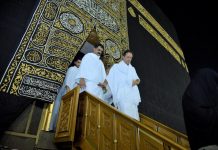مضمون کا ماخذ : بہت کچھ
Shun political rivalries in national interest: PM
ISLAMABAD: Prime Minister Nawaz Sharif on Friday said it was high time for all to shun political rivalries and focus energies on eliminating poverty and illiteracy from the country. “It is need of the hour to refrain from negative politics and get united in the interest of Pakistan,” he said during his address at the […]
ISLAMABAD: Prime Minister Nawaz Sharif on Friday said it was high time for all to shun political rivalries and focus energies on eliminating poverty and illiteracy from the country.
“It is need of the hour to refrain from negative politics and get united in the interest of Pakistan,” he said during his address at the groundbreaking of Kurram Tangi Dam.
The prime minister said unity among the nation could help overcome difficult challenges and make the country economically strong. “When it comes to Pakistan’s interest, all need to stand by each other.”
Nawaz said that even terrorism, being the toughest of challenges, was addressed with unity of the nation and consensus of all political forces and the military.
“Now we have to stay united for the prosperity of country after defeating the menace of terrorism,” he said.
He mentioned that the people of North Waziristan and armed forces had rendered immense sacrifices in elimination of terrorists, which ultimately led to peace in the area.
After an era of horror and fright, a new dawn of love and peace has begun in North Waziristan, he said.
He said that development of Federally Administered Tribal Areas (FATA) was the government’s priority, adding that the process of including FATA in national mainstream would be initiated soon after proper legislation.
He said FATA would also get its due share in National Finance Commission Award. He said all the provinces and federal government would fulfil their responsibilities for the uplift of FATA. He said the project of Kurram Tangi Dam in North Waziristan was an important milestone in development of FATA.
The project would be completed at a cost of Rs 123 billion, of which Rs 81 billion would be provided by the United States government through USAID and the rest, Rs 16 billion, by Pakistan government, he added.
The prime minister said the government was pursuing an effective agriculture and water management policy and building dams even on small rivers. He regretted that previous governments ignored this key sector and no large dam was built after Tarbela during the last 40 years.
He said his government took solid steps for carrying out dam-related projects, including Diamer-Bhasha, Neelum-Jhelum, Dasu and Bunji.
Nawaz Sharif said he had directed the authorities concerned to speed up the electricity generation projects and added, “Power load shedding will soon become a tale of the past.” He said Pakistan was a resource rich country and it could make revolutionary progress provided the judicious and prudent utilisation of resources.
“We can make our destiny ourselves and I believe that a magnificent future is awaiting us,” he said.
Meanwhile, Nawaz Sharif chaired a high-level security meeting at the PM’s House to review Operation Radd-ul-Fasaad, and expressed resolve to continue the offensive until all targets were achieved.
The meeting, which was attended by senior civil and military officials, agreed to continue the operation against terrorism in all its forms and manifestations with the “fullest might of the state”. The meeting was attended by Interior Minister Chaudhry Nisar Ali Khan, Finance Minister Ishaq Dar, Chief of Army Staff (COAS) General Qamar Javed Bajwa, Adviser to PM on Foreign Affairs Sartaj Aziz, National Security Adviser Lt Gen (r) Nasser Khan Janjua and ISI DG Lt Gen Naveed Mukhtar.
The prime minister said Pakistan had given immense sacrifices in its own war against terrorism.
“We are fully determined to remain steadfast in our commitment and duty to undertake all steps for eliminating terrorists without any discrimination of geographic region, colour or sect,” he said.
The prime minister said that across-the-board consensus among all stakeholders and the overwhelming sentiments of people against terrorism “guarantee the wining of this war”.
The participants of the meeting underlined that the ongoing operation reflected the unilateral national resolve and commitment to complete obliteration of terrorism from the country.
They reiterated that national unity and support were indispensable for successful implementation of the anti-terror strategy.









